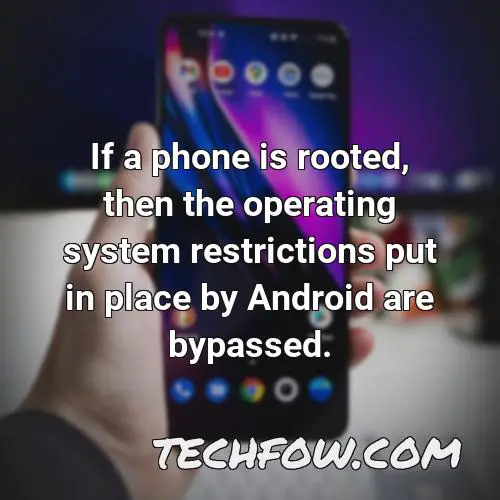Rooting your phone can cause it to malfunction or even be completely destroyed. Rooting is the process of removing restrictions on a device, allowing it to be used in a way that is not normally possible. This can include gaining access to the device’s operating system or files. There are many different types of rooting methods, and some are more risky than others. Always consult your phone’s user guide before attempting to root your device.
Before we get started
If you’ve ever dropped your phone in water, you know that it’s not always easy to get it working again. Even if you dry it off quickly, the water can cause damage to the phone’s electronic components.
Similarly, if your phone is rooted, the root access granted to you by the phone’s manufacturer can allow malicious individuals or software to do damage to your phone. Rooting your phone allows you to install custom applications and change system settings. If you’re not careful, a malicious application or someone with access to your phone’s root access could damage your phone in a number of ways.
Rooting your phone can also give someone access to your phone’s data, which could include personal information or images. If you’re not careful, someone with access to your phone’s root access could steal your data or even harm your phone in other ways.
If you’re thinking about rooting your phone, make sure to do it safely and ensure that you understand the risks involved.

Does Root Harm Your Phone
Rooting your smartphone enables you to access and modify the software that runs on the device. This can include disabling some security features and gaining access to additional features or data. Rooting is not a security risk, but it can disable some security features and make the device less secure.

What Happens to Phone After Root
If a phone is rooted, then the operating system restrictions put in place by Android are bypassed. This means that worms, viruses, spyware, and Trojans can be installed on the phone if it’s not protected by an effective mobile antivirus for Android. This can be a big security risk, especially if the phone is stolen or if it’s not properly secured.

What Are the Disadvantages of Rooting
Rooting your device can make it more vulnerable to malware attacks, and it can also void your phone’s service or warranty. If you brick your device, that is, if you damage it so badly that it can’t be fixed, you will have to buy a new one.

What Does It Mean When a Device Is Rooted
Rooting is the process of gaining access to the operating system on a device in a way that is not normally available to the user. On Android devices, this typically means gaining access to the root directory, which contains information about the device’s configuration and files that are not accessible to the user. This privileged access can be used to change the device’s configuration, install applications that are not available through the normal Android app store, or access files and data that are normally hidden from the user.

Does Rooting Improve Performance
There is no universal answer to this question as rooting can have a variety of benefits and drawbacks. While some people argue that rooting can improve performance, it is ultimately up to the user to decide whether or not they want to root their device. Rooting can grant you access to custom ROMs and other tweaks that can improve your device’s performance and make it more customizable. However, rooting can also void your warranty and can even brick your device. Therefore, be sure to research the pros and cons of rooting before making a decision.

Can You Jailbreak an Android
Jailbreaking an Android phone basically means gaining root access to it. This gives you access to a lot of system files and settings that you wouldn’t normally have access to. Rooting can also give you access to custom ROMs, which can provide you with additional features and functionality not available in the official Android firmware.
Last but not least
If you want to root your phone, be sure to do it in a safe way. Rooting can be risky, and it can damage your phone if done incorrectly. Be sure to consult your phone’s user guide before attempting to root your device.

